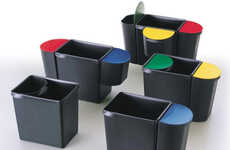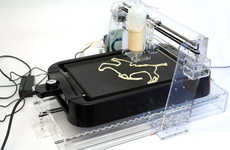
This Futuristic Robotic Trash Can Invention is Made from Recycled Bins
Deborah Kim — July 18, 2011 — Tech
The genius behind the YouTube account 'hardmouse197,' a Taiwanese born inventor, crafted their own Android robot for all under $100. This adorable Android robot made from a trash can is absolutely precious, and watching it move around is like living out a dream come true.
The body of the Android is green and was made from a trash can bought from a dollar store. The rest of the finer details are modeled after the Android logo with the eyes made from LED light bulbs and the antennas and arms made from thrifted plastic. The legs and arms of the robot are movable and are controlled by a remote and joystick, and the robot moves on wheels, making its movements more fluid. And although this futuristic robotic trash can wouldn't much actual waste, it sure does make a neat robot-on-a-budget.
The body of the Android is green and was made from a trash can bought from a dollar store. The rest of the finer details are modeled after the Android logo with the eyes made from LED light bulbs and the antennas and arms made from thrifted plastic. The legs and arms of the robot are movable and are controlled by a remote and joystick, and the robot moves on wheels, making its movements more fluid. And although this futuristic robotic trash can wouldn't much actual waste, it sure does make a neat robot-on-a-budget.
Trend Themes
1. DIY Robotics - Creating robots from everyday objects provides an opportunity for hobbyists and professionals to explore creative avenues for automation.
2. Recycling Innovation - Repurposing wasteful materials for other uses can lead to more sustainable and inventive products and solutions.
3. Affordable Automation - Building robots at a low cost offers accessibility for those with limited resources, making it possible for anyone to experiment and innovate with robotics.
Industry Implications
1. Manufacturing - Using recycled materials in manufacturing can lead to cost savings as well as opportunities for more sustainable production processes.
2. Education - Exploring DIY robotics can provide opportunities for hands-on learning in STEM fields, allowing for discovery and creativity.
3. Waste Management - Incorporating robotics and automation in the waste management industry can lead to more efficient and effective methods for waste disposal and recycling.
3.5
Score
Popularity
Activity
Freshness















